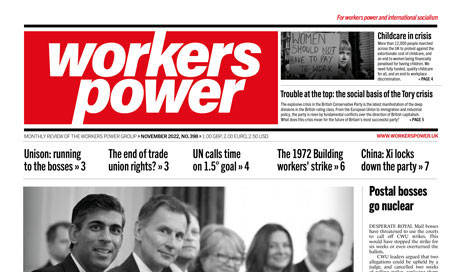

By KD Tait
THE MOTIVATION of the Labour Party’s leaders, and behind them the leaders of all the main trade unions without exception, for an immediate general election is to short-circuit the winter of discontent which the trade union leaders have delayed, disorganised, and disunited for as long as possible. Does this demonstrable fact mean that we should be against a general election or counterpose it to protests and strikes?
No. Neither Liz Truss nor Rishi Sunak’s programme have a shred of popular mandate. A general election leading to a Labour government is, at present, the most likely road to ousting the Tories from office.
Petitions and demonstrations exposing the illegitimate character of this bankers’ government can play a role in cohering opposition.
But demonstrations alone will not force the Tories to overthrow their own government and trigger an election they will, in the present circumstances, lose. Secondly, the character of the opposition—its objectives, strategy and leadership—is not a secondary factor.
At present the opposition is organisationally and politically defined in the form of Keir Starmer’s shadow cabinet and the TUC leadership. We should not write that leadership a blank cheque by uncritically echoing their calls for a general election.
By divorcing the slogan of a general election from the intensifying industrial struggle to defeat the public pay cap, the Labour and trade union leaders wish to deflect workers attention away from their own frantic desire to avoid generalising the industrial struggle to the point where it could obstruct and ultimately bring down the government. In short they want the democratic process to pull their irons out of the fire.
It is the struggles of the working class, through their trade unions and social mobilisations against landlords, energy monopolies and climate polluters, that need to become the decisive factor in bringing down the government. Elevating the general election to a democratic principle separate and above the class struggle in its totality is substituting revolutionary strategy for parliamentary manoeuvres.
An election is only one component of the struggle—and it can best be secured by defeating the government’s programme on the streets and in the workplaces. That means stepping up the ongoing discontinuous strikes, winning the ballots for more actions, forcing Labour to support the strikes and inflation busting pay deals—and forcing Labour to take up workers’ demands and be held accountable to them.
Millions of workers would rightly vote Labour to kick out the Tories. But that would only be the start. What the markets did to Liz Truss’ government they will do in double quick time to a Labour government that stepped out of line.
For revolutionaries, the struggle over the programme of a Labour government starts by fighting to alter the balance of class forces now. We want to oust the Tories on our terms and in so doing put our movement in the strongest possible position to force Labour to break with the bosses.
In short it is bound up with the fight to resolve the crisis of working class leadership by building an alternative, revolutionary communist leadership, which has the perspective and programme for the seizure of power by the working class. The election of a Labour government is at best a tactic in that overall strategy.
Fight for a workers’ government
Jeremy Hunt will announce the bankers’ budget on 17 November. The new government will be a weapon of class war in the hands of the banks and financiers against the working class. Defeating its anti-working class programme and forcing it from office will take mass resistance.
We must not give the Tories any more breathing space to reorganise themselves. They have already been given too much by the stop-start tactics of one or two day strikes during the summer. The TUC, trade unions and wider working class movement must mobilise protests and walkouts on budget day to oppose the bosses’ offensive under the slogan: ‘Tories out—fight for a workers’ government!’
Now is the time to press our advance across every front of struggle. All-out indefinite strike action for every claim can paralyse the government and bring them down. Elected strike committees and councils of action in every town and city can establish a new rank and file leadership.
A Labour government elected under these circumstances would have to answer to the working class if and when it acts against their interests. Indeed it can pave the way for a real workers’ government, answerable to our own organisations of struggle rather than the cabal of rotten Labour MPs and the capitalist system they defend. In this struggle we propose united action to: